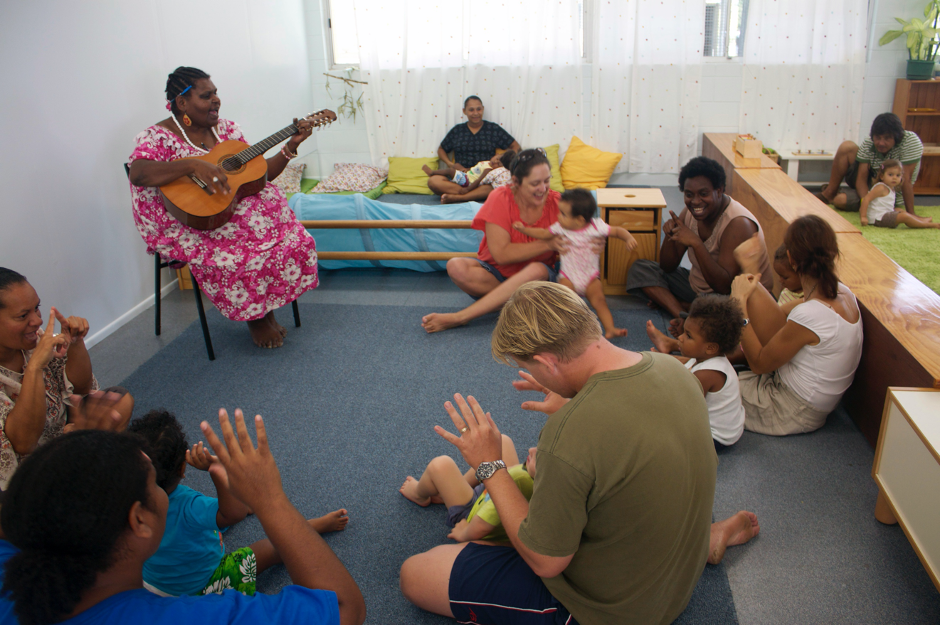YUMI Community News
Read the latest community news and updates from our program participants across the Torres Strait.
Taba Naba
One of our best-loved and well-known tunes, “Taba Naba” is a traditional song originating from the Eastern Islands in the Torres Strait. Made popular around Australia by Christine Anu with the Wiggles, it describes the everyday activity of going out to the reef to fish. Here’s how we use it for ‘mat time’ in Strait START…
One of our best-loved and well-known tunes, “Taba Naba” is a traditional song originating from the Eastern Islands in the Torres Strait.
It is sung in the language of Meriam Mir and describes the everyday activity of going out to the reef to fish. Taba Naba is popular throughout Australia and the rest of the world thanks to renditions by the iconic Mills Sisters and children’s entertainers The Wiggles.
Taba Naba is a joyful song and is usually accompanied by a “sit down” dance. The traditional movements by the dancers correspond to the songs lyrics.
TABA NABA
Taba naba naba norem,
Tugei pe neiser mi, dinghy ge nabatre,
Mi ko kei miserer em nebewem,
Taba naba norem
Come let us go the reef,
While morning tide is low, let us go in the dinghy,
Let us go to the edge of the reef,
Come let us go the reef
Children at our Strait Start program singing Taba Naba with their teachers, parents and carers.
Our voice matters: Guiding cultural competency for Australian teachers
The Australian Institute for Teaching and School Leadership (AITSL) is currently leading a project on developing the existing teaching workforce's cultural competency. With input from TSIREC and Tagai State College leaders, AITSL has recently launched a discussion paper that outlines the current knowledge and understanding of cultural competency and its practice among the teaching workforce and highlights some of the challenges and barriers faced in undertaking this work.
Leading education researchers and national policymakers are visiting Thursday Island early next month to seek input from TSIREC members and community leaders about future initiatives to increase the cultural competency of the teaching workforce
What does cultural competency mean?
According to the National Education Association (US), Cultural competence means understanding your own culture, other's culture, and the role of culture in education.
Research over decades shows that by using students' culture as a basis for learning, communicating high expectations, and reshaping curriculum to reflect students' diversity, an educator can achieve better educational outcomes.
The Australian Institute for Teaching and School Leadership (AITSL) is currently leading a project on developing the existing teaching workforce's cultural competency.
With input from TSIREC and Tagai State College leaders, AITSL has recently launched a discussion paper that outlines the current knowledge and understanding of cultural competency and its practice among the teaching workforce and highlights some of the challenges and barriers faced in undertaking this work. A further focus of the paper is to increase the understanding of cultural safety in Australian schools.
On Tuesday 2nd March 2021, AITSL is hosting a forum with TSIREC and our invited community representatives. This forum aims to connect our voices and research in education further to unpack the areas of discussion of the paper.
AISTSL are also seeking our input and guidance on the Aboriginal and Torres Strait Islander community's needs and aspirations in increasing cultural competency of the teaching workforce, including the co-design and development of a suite of resources and tools.
Want to know more?
You can read AITSL’s discussion paper
Watch AITSL’s Carly Jia, Senior Advisor, Aboriginal and Torres Strait Islander Education, as she shares her tips for culturally competent teaching in the video below.
5 reasons why Strait Start is better than ever
In late 2020, five new Strait Start services opened their doors and were welcomed by the smiles of young children across the Torres Strait.
Under a partnership between TSIREC, YUMI Education and Tagai State College, the Strait Start program has offered early education and parenting services in our communities for over ten years. In 2020, however, all services were closed so an independent review could consider how the program could be improved and made more sustainable into the future.
This process of review and redesign has resulted in significant improvements for the much-loved program. Here are those improvements.
In late 2020, five new Strait Start services opened their doors and were welcomed by the smiles of young children across the Torres Strait.
Under a partnership between TSIREC, YUMI Education and Tagai State College, the Strait Start program has offered early education and parenting services in our communities for over ten years. In 2020, however, all services were closed so an independent review could consider how the program could be improved and made more sustainable into the future.
This process of review and redesign has resulted in significant improvements for the much-loved program.
1. Focus on Quality = More targeted resources.
A reduction in the number of individual services (from 10 in 2019 to 5 in 2020) has allowed leaders to focus on implementing better support programs, higher resourcing levels, and greater use of quality controls.
2. Redesign Leadership = Clearer lines of supervision
Tagai's early years' supervision structure now includes the operational support of Strait Start services as a critical role for the Head of Department Early Years. This means that there is now accountability for Strait Start built into the existing leadership structure of Tagai State College.
3. New Coordinators = Better Professional Support
The recruitment of five new Strait Start Coordinators led to a complete redesign of the program's training and professional support structures. In addition to an induction program and regular site-visits by trainers, coordinators now have access to a new online learning portal and weekly teleconferencing.
4. Clear Purpose = Productive Partnerships
The clarification of the program's purpose as parent education and engagement service, a pivot from the previous focus of early education services, has allowed program leaders to establish more targeted and productive partnerships with other regional early childhood service providers.
Strait Start is now coordinating its work with the Hospital and Health Service teams, the regional council and Tagai State College specialist staff through the regional early childhood interagency group.
5. Solid foundations = Opportunities for growth
The review and redesign process undertaken in early 2020 has helped ensure that the five new services have been rebuilt on solid foundations, with a clear focus on their long-term sustainability. It is on these foundations that future expansion to more communities will be designed.
Of course, these five reasons pale into insignificance when they are compared to the more than 100 smiles we receive every week from the young children and families that enter one of our programs each week.
For more information about Strait Start, visit your local service or visit our Strait Start page over on the Yumi website.











